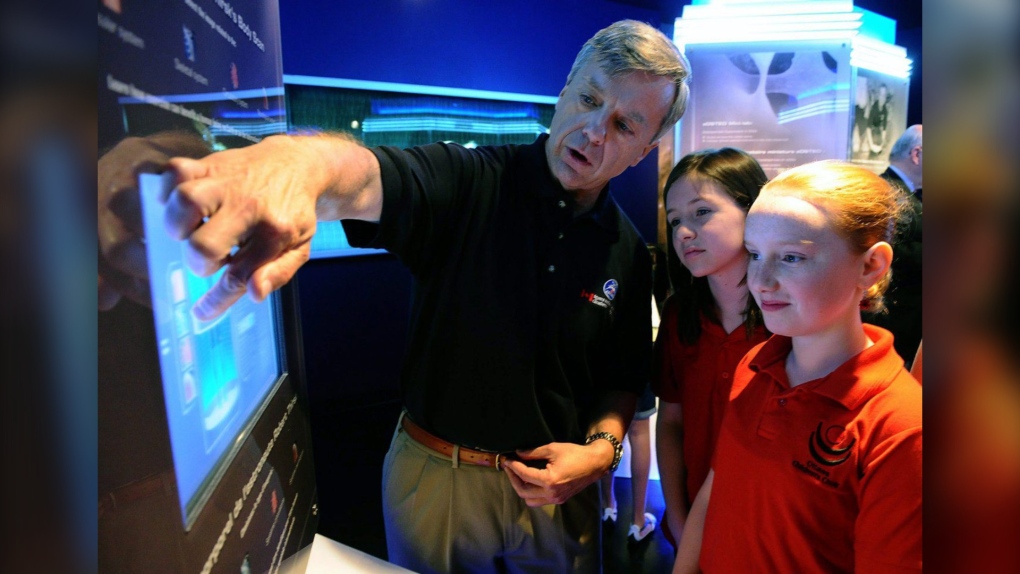'Permanent bone loss': Calgary study finds astronauts suffer on return to Earth
 FILE - Canadian astronaut Robert Thirsk talks with students from Rockcliffe Elementary School as they get a first look at The Living In Space exhibit during its unveiling at the Canadian Aviation and Space Museum in Ottawa on Thursday, May 12, 2011. (THE CANADIAN PRESS/Sean Kilpatrick)
FILE - Canadian astronaut Robert Thirsk talks with students from Rockcliffe Elementary School as they get a first look at The Living In Space exhibit during its unveiling at the Canadian Aviation and Space Museum in Ottawa on Thursday, May 12, 2011. (THE CANADIAN PRESS/Sean Kilpatrick)
The experience may be out-of-this-world but research indicates those who travel to outer space suffer from increased bone loss.
A study released Thursday from the Cumming School of Medicine at the University of Calgary followed 17 astronauts before and after their space flights.
The TBone study, conducted over a seven-year period starting in 2015, found that prolonged weightlessness accelerated bone loss in the astronauts.
"We found that weight-bearing bones only partially recovered in most astronauts one year after spaceflight," said Dr. Leigh Gabel, an assistant professor in the faculty of kinesiology and lead author of the study.
"This suggests the permanent bone loss due to spaceflight is about the same as a decade worth of age-related bone loss on Earth."
The researchers travelled to Johnson Space Center in Houston to scan the wrists and ankles of the astronauts before they left for space, on their return to Earth then after six months and one year.
The findings, published in Scientific Reports, said the loss happens because bones that would normally be weight-bearing on Earth, such as the legs, don't have to carry weight in a zero gravity setting.
"We've seen astronauts who had trouble walking due to weakness and lack of balance after returning from spaceflight to others who cheerfully rode their bike on Johnson Space Center campus to meet us for a study visit," said Dr. Steven Boyd, director of the McCaig Institute for Bone and Joint Health and professor in the Cumming School of Medicine.
"There is quite a variety of response among astronauts when they return to Earth."
The study found some astronauts who flew on shorter missions, under six months, recovered bone strength and density in the lower body compared to those who flew for longer durations.
As future space missions are exploring travel to more distant locations, the study's next iteration plans to look at the effects of even longer trips, to support astronauts who may one day travel beyond the International Space Station.
The University of Calgary's former chancellor and astronaut, Robert Thirsk, said he knows how difficult it can be to be back on solid ground.
"Just as the body must adapt to spaceflight at the start of a mission, it must also readapt back to Earth's gravity field at the end," he said.
"Fatigue, light-headedness and imbalance were immediate challenges for me on my return. Bones and muscles take the longest to recover following spaceflight. But within a day of landing, I felt comfortable again as an Earthling."
The study was funded by the Canadian Space Agency in partnership with the European Space Agency, NASA and astronauts from North America, Europe, and Asia.
This report by The Canadian Press was first published June 30, 2022.
CTVNews.ca Top Stories

BREAKING Canada lists Ansarallah, known as the Houthis, a terrorist entity
The Canadian government has listed Ansarallah, commonly known as the Houthis, as a terrorist entity.
Wind chills of -50, snowfall of up to 50 cm: Canada's weather forecast
As the second day of December unfolds, Canadians from coast to coast are experiencing a range of wintry conditions. Here's what's happening in different parts of the country.
Kingston, Ont. doctor ordered to repay $660K for pandemic vaccination payments
An Ontario health tribunal has ordered a Kingston, Ont. doctor to repay over $600,000 to the Ontario government for improperly billing thousands of COVID-19 vaccinations at the height of the pandemic.
'Ally to the North': Ontario launches U.S. ad campaign amid Trump's tariff threat
Ontario is launching a U.S. ad campaign, touting the province as an 'ally to the North' ahead of President-elect Donald Trump’s second term and under the threat of tariffs on all Canadian goods.
Multiple elements contributed to fatal Chinook helicopter crash in Ottawa River, investigation concludes
The investigation into a Chinook helicopter crash near Petawawa, Ont. that killed two military pilots concludes an 'unperceived acceleration' and environmental conditions were "significant contributors" to the crash in the Ottawa River.
Kremlin says Trump threat to BRICS nations over U.S. dollar will backfire
The Kremlin said on Monday that any U.S. attempt to compel countries to use the dollar would backfire after U.S. president-elect Donald Trump threatened to impose tariffs on BRICS countries if they created their own currency.
Crews work to reopen highway north of Toronto after major snowstorm hits cottage country
Crews are still working to reopen Highway 11 north of Toronto after parts of Ontario’s cottage country were hit with upwards of 140 centimetres of snowfall over the weekend.
Elton John says he has lost his eyesight and struggles to see his new stage musical
Elton John says he struggled to watch his new musical because he has lost his eyesight after contracting an infection.
U.S. Postal Service suspends accepting mail bound for Canada due to strike
The U.S. Postal Service has temporarily suspended accepting mail headed to Canada due to the strike by Canada Post workers.


































